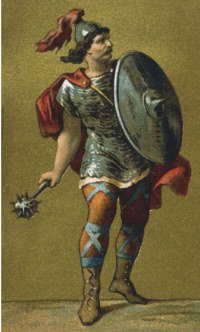Reflections on the anniversary of a historical turning point…
Within fifty years of the death of Mohamed in A.D. 632, his successors had engineered military conquests all across the Middle East and North Africa.
While their pace slowed after that, as they worked to consolidate their gains and establish bureaucratic management over the extensive lands they had won, the Muslims continued to expand, crossing Gibraltar and conquering much of the Iberian peninsula, in preparation for their eternal goal: the conquest of Europe.
Now, Europe in those days was hardly the organized collection of developed, defined, modern states we know today. Spain and Portugal fell as soon as the Muslims crossed the straits of Gibraltar. And with Europe little more than a shapeless hodgepodge of feudal realms back then, the Muslims were sure they could expand their caliphate easily once they crossed the Pyrenees.
We like to think of the Frankish empire as having replaced that of the Romans, but it was far from apples to apples, in reality. By the early 700s, Frankish kings – the distant descendents of Clovis – had really devolved to little more than a figurehead role, with what little power there was being held by a hereditary chief of staff, then known as the Mayor of the Palace.
Worse still, the Franks were always carving up and reforming their boundaries, because of a generous but hammerheaded approach to the concept of inheritance: every time a king died, they split the kingdom he had built among his two or three preferred sons. So, for a couple hundred years, borders were always moving, and vassals weren’t always sure who their lords were, or how long those lords would remain in power.
Doesn’t sound like the formula for a well-defended war machine, ready to face a committed army bent on world conquest, does it?
Well, fortunately for Western Civilization, Charles Martel, son of Pepin, had become Mayor of the Palace at this point – having taken the helm at Austrasia in 715 and added Neustria in 718 – and he was special.
As soon as Charles Martel saw the Muslim war machine grow in Spain, clearly in preparation for external action, he knew what was coming, and he went to work.
Charles Martel traveled across Europe for years, throughout the Frankish kingdoms and their nearby allies, making the case, from fortress to fortress, from castle to castle, from vassal to vassal, convincing every major and minor noble of the threat that they would face in the years to come. And he did it. One by one.
Some of us remember George HW Bush’s famous diplomacy, 30 years ago, convincing country by country, one by one, to join a broad coalition against Iraq, in response to Iraq’s invasion of Kuwait. As each country joined the coalition, it brought divisions of soldiers, heavy artillery, airplanes and logistical support.
Charles Martel’s circumstances were much different, to say the least.
From each castle he convinced to join the cause, Charles could hope for mere dozens of soldiers, if that. But Western Civilization was on the line – yes, it was, and he saw it, even if no one else did – so he kept traveling, he kept arguing, and he kept building this coalition, an association of hundreds and hundreds of outposts, so that when the Muslims finally marched across the Pyrenees in 732, the Franks – against all odds – would have a force ready and willing to meet them.
We don’t know the exact numbers who faced off at the Battle of Tours, on October 10, A.D. 732. Respectable military historians’ today have estimates all over the place, from 30,000 each, to 20,000 Franks against 80,000 Muslims, to as much as half a million in total. A number of likely unreconcilable gaps in the archaeological record make it very unlikely that we’ll ever know.
But here is what we do know, without the slightest doubt:
We know that the Muslims set out to conquer Europe, and that it was for them as much a religious goal as a military one. Their caliphate wanted to replace Christianity on earth (as it still does, to this very day).
We know that Western Europe, like North Africa before it, posed little of a challenge on its own. Western Europe had been overrun, time and time again, by eastern raiders like Huns, Visigoths and Ostrogoths, and would be overrun again in the future, from the north, at the hands of such northern raiders as the Vikings.
So what was special about the Battle of Tours, on that consequential autumn day in 732?
The Muslim invasion of Europe was different from all those Germanic tribes and Viking raiders. The Muslim invasion had a power, a purpose, and a permanence to it that showed through, beyond the swords and spears.
If you studied it, you could see what a Muslim victory could mean to your country, and you could see how imperative would be its defeat.
But who was there to study it?
In the early eighth century, with do-nothing kings and independent feudal lords, all minding their own business across Europe, lacking the modern communications of radio and television, lacking war colleges and technical analysts… who was there, really, to peer across the Pyrenees, or to look across the Mediterranean, and see what surprise invasion might be planned for their quiet land?
There was Charles Martel.
Only Charles Martel.
There are many branches of historians in the world. There are those who worship the Marxist dialectic, insisting that the march of time will occur regardless of individual efforts…
There are those who focus on religions and philosophies, on trade end populations, and maintain that history is determined by popular movements, by broad public attitudes…
And there are those of the heroic view, who recognize the many moments in time when one single man or woman stood tall, recognized a need or a threat or an opportunity, and single-handedly made it happen.
October 10, A.D. 732, was indeed such a moment, and Charles Martel was indeed such a hero.
Uniquely situated as Mayor of the Palace of the Frankish people, this visionary recognized a desperate need, and with single-minded effort, Charles Martel built the alliance, raised the money and equipment, and designed a plan to stop the Muslim hordes in their tracks, successfully turning them back beyond the Pyrenees.
In a century of expansion, the Muslims had never really been stopped before. The Battle of Tours was to be their first real recognition that they could be defeated, that they could be turned back, and that Europe somehow would be different for them than Africa.
The caliphate never gave up on Europe, of course. Europe is Christendom, and the caliphate is called to vanquish it someday. But again and again, over the centuries, at such major battles as Lepanto and Vienna to come, the Christian world would rise to the challenge, and again and again, would stop the spread of Islam… for a generation, for a century… always knowing, of course, that we would face them again.
The Battle of Tours was the first of these great moments. And Charles Martel was the first of these visionaries.
King John III Sobieski, Don Juan of Austria, and all the many others who have fought against Islamic expansion over the centuries, all owe a debt of gratitude to Charles Martel, the medieval soldier who recognized a terrific threat… And who, with the hand of Divine Providence to guide him, rose to meet that threat on the field of battle.
Copyright 2022 John F Di Leo
A collection of John’s Illinois Review articles about vote fraud, The Tales of Little Pavel, and his 2021 political satires about current events, Evening Soup with Basement Joe, Volumes One and Two, are available, in either paperback or eBook, only on Amazon.
Don’t miss an article! Use the free tool in the margin to sign up for Illinois Review’s free email notification service, so that you always know when we publish new content!









